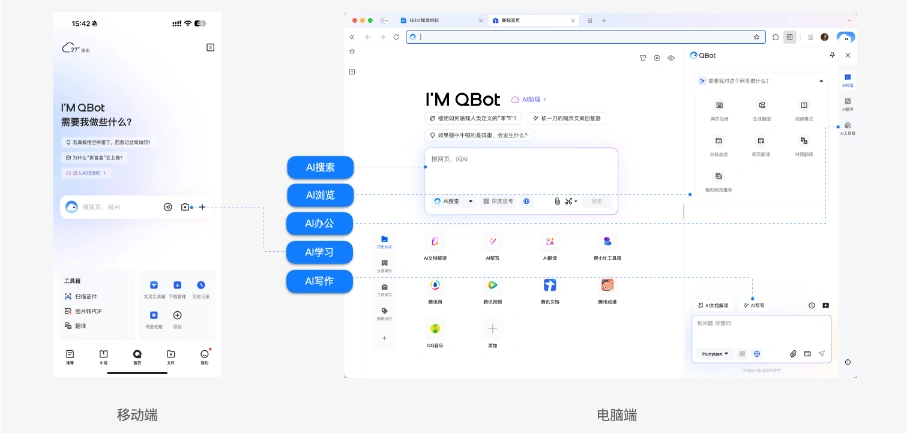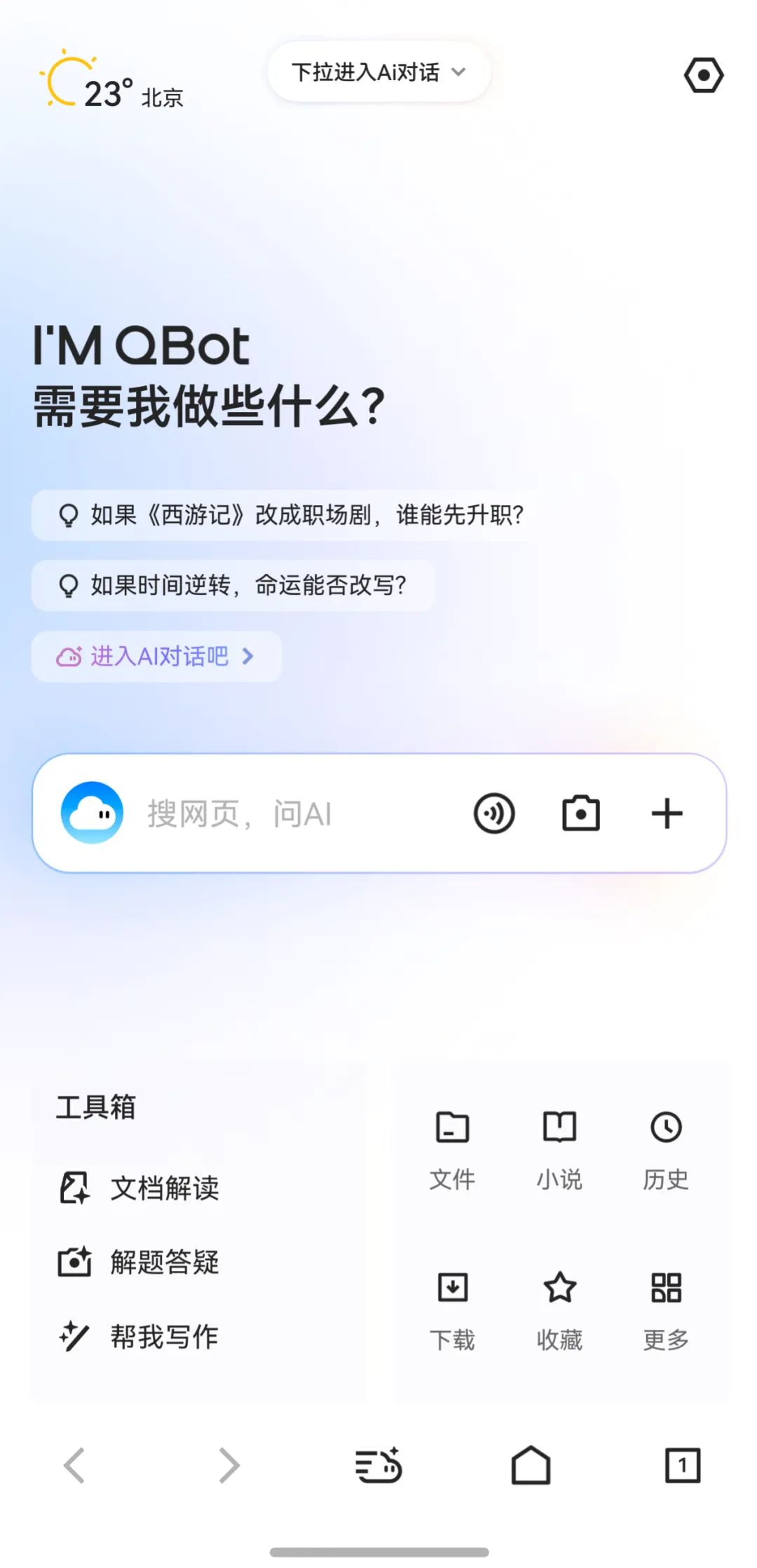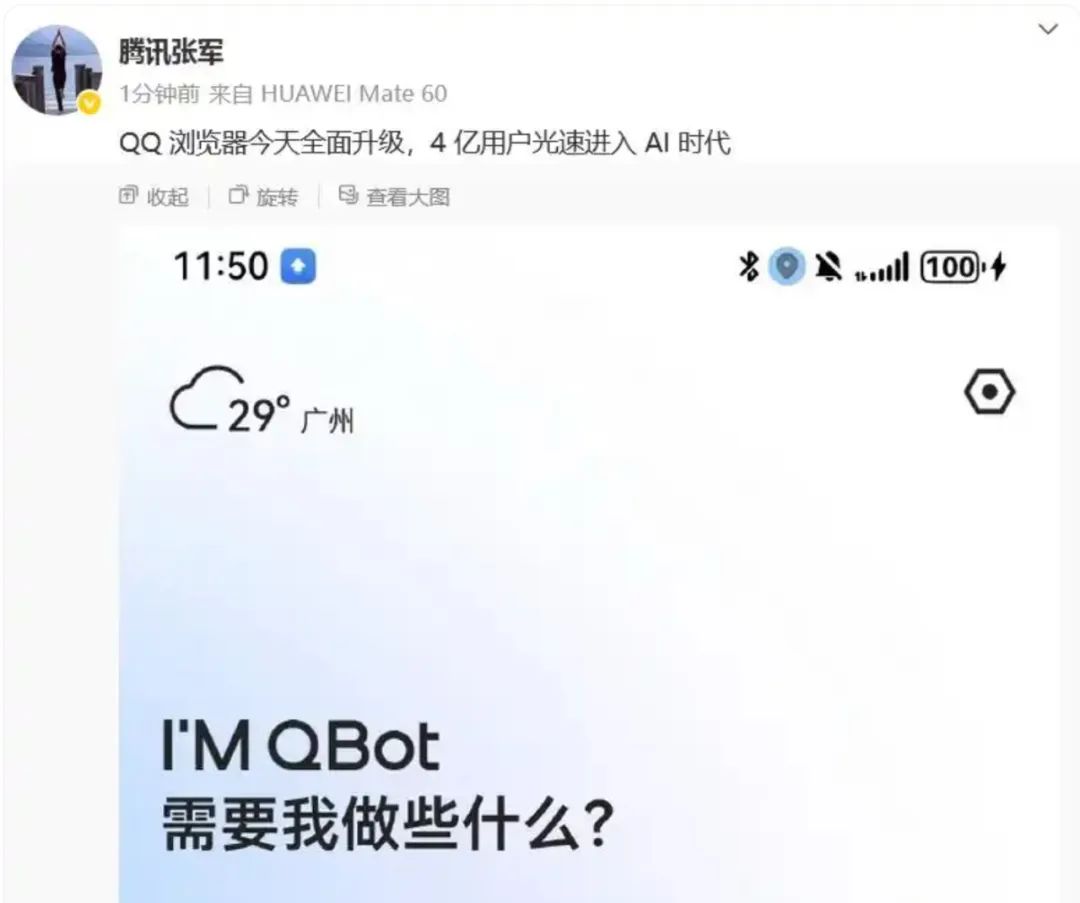Did Tencent QQ Browser Emulate Quark?
![]() 05/20 2025
05/20 2025
![]() 914
914
Has Tencent also created a "Quark"?

Image source: Official promotion
On May 19, Tencent announced the upgrade of QQ Browser to an AI Browser. Compared to traditional browsers, the new version of QQ Browser showcases two significant changes:
Firstly, the overall interface design (UI), function display, and overall aesthetic are more modern, minimalist, and youth-oriented.
Secondly, the introduction of QBot, powered by Tencent's Hunyuan and DeepSeek models, focuses on "effortless AI usage." Its homepage grants direct access to QBot, offering five core functions: AI search, AI browsing, AI office, AI learning, and AI writing.
Additionally, QBot can summon Agents to perform complex tasks. The initial batch of Agents currently in a phased rollout includes the "AI Gaokao Tong" for college entrance exams, download assistant, update assistant, stock assistant, among others.
QQ Browser's AI Transformation
Taking the native HarmonyOS version as an example, the most prominent feature on the new QQ Browser homepage is a "search box" with the prompt "Search webpages, ask AI."
By clicking the "camera" icon (for photos and screenshots) and "+" icon (for more options) on the right side of the search box, users can access QBot, which "assists with intelligent search, file processing, writing optimization, and more."

Image source: Screenshot by Tang Chen, native HarmonyOS version
Moreover, long-pressing the "cloud" icon to the left of the search box allows switching between different search engines, including Sogou and Baidu. The new QQ Browser homepage is divided into two functional zones above and below the search box:
Above the search box, users find settings, weather, and a prominent "QBot usage guide." Clicking on the default guide words, such as "Help me write: a Versailles-style speech for a class reunion," enters chat mode, offering a choice between DeepSeek and Hunyuan models.
Of course, the conventional pull-down gesture also engages QBot for "AI Dialogue" - QQ Browser's team should note the spelling flaw in the guiding text.
Below the search box are function aggregations and a new navigation bar. The "Function Aggregation" section is divided into two parts: AI Function Toolbox (e.g., document interpretation, problem-solving, Q&A) and a collection of conventional browser functions (e.g., files, novels, downloads).
On mobile devices, QBot supports multimodal search, including voice, file, and scan search. A unique feature allows quick invocation outside the app; users can summon QBot anytime on their computers, and screenshots can invoke QBot for interpretation.
Zhang Jun, Director of Public Relations at Tencent, tweeted about the upgrade: "QQ Browser has undergone a comprehensive upgrade today, with 400 million users entering the AI era at lightning speed."

Image source: Internet screenshot
During my usage, I noticed that as of writing, the AI-upgraded version of QQ Browser was not yet available on the App Store but was downloadable on Android app stores, with "QBot AI Agent" appended to the "QQ Browser" icon. It is understood that QBot will collaborate with Tencent's internal products to explore intelligent agents akin to the Manus workflow.
Notably, when users enter their queries in the search box, they receive two search results simultaneously: "AI Search" and "Web Search." In response, Liu Hanbo, head of the QQ Browser QBot product, stated, "We're not directly removing the web search because many users still rely on it for addresses, fixed websites, or content consumption. We leave the choice to the users."
While this explanation is reasonable, it also suggests that the QQ Browser team hasn't fully decided on how to create a true AI browser, displaying a mixed mindset of wanting both AI upgrades for enhanced user experience and retaining traditional browser habits for old users.
According to Liu Hanbo, user engagement has increased among those in the AI feature phased rollout, positioning QQ Browser as a tools + platform. In the mobile internet era, browsers' platform value has diminished, while their tool value has risen amidst increasingly fragmented user scenarios.
Is this a new "Quark"?
Despite the assertion that "in the era of large models, all products will be reconstructed by AI," many industry insiders and media, upon seeing QQ Browser's upgrade, have a common reaction: the UI design and product philosophy are strikingly similar to Quark's.
For instance, the "Super Search Box" on the homepage integrates functions like AI learning and AI office. Specifically, AI learning provides step-by-step solutions for math, physics, chemistry, and English problems (search and solve). "Isn't this an ability Quark first introduced? QQ Browser directly adopted it."
Some comments also pointed out that QQ Browser's highlighted five AI capabilities after the AI upgrade "are almost identical to Quark's," implying "Tencent's core competitiveness is imitation." Players like QBot benchmarking Quark and taking a pragmatic AI products and services route indicate Quark's industry recognition and pursuit.
On the last day of February this year, Quark announced the completion of a comprehensive upgrade for its app and PC ends: the homepage was redesigned, and Quark AI Search introduced "Deep Thinking." This marked the first time Quark integrated large models' deep thinking ability into its AI search function.
At that time, Zheng Sishou, head of Quark products, said that based on AI, the search industry has reached a critical juncture of generational change and will enter a new era of AI search. I interpret this as meaning that large AI models are reshaping search services, with fundamental and value dimensions undergoing disruptive changes. Based on new AI capabilities, the search industry distinguishes between traditional and AI search.
Traditional search, reliant on existing user bases, product volumes, and business models, can only incrementally add AI functions and content through later modifications. Over the past two years, Quark has continuously upgraded and expanded the boundaries of AI search, becoming a flagship for Alibaba's AI on the consumer side.
In 2024 alone, Quark launched the "Super Search Box" and "System-level Full scene AI." In January 2025, Quark upgraded its brand slogan to "The AI All-rounder for 200 Million People."
Regarding operational strategies, QQ Browser has also focused on younger demographics. For example, it was among the first to launch exploration guides for 80 universities and the "University Freshman Season" event. Freshmen can search for "University Freshman Season" in the QQ Browser app to reach the event's main page or input their "university name" and select the "Freshman Season" tag for university-specific guides.
From a user perspective, QQ Browser faces similar issues as Quark and other similar products, with increasing functionality, complicated designs, and constantly shifting entry points, giving a sense of a patchwork. Some vendors might launch entirely new search products, divert traffic through various means, but ultimately fail to generate strong user loyalty due to weakened marketing efforts, only to abandon users after exploitation.
The latest report by market research firm Statcounter shows that in the Chinese browser market across all platforms in April 2025, Chrome held a 44.64% market share, ranking first, while QQ Browser ranked seventh with 4.62%.
Tencent's AI Strategy Logic
Nonetheless, QQ Browser has taken this step, emulating Quark within Tencent. This is understandable within the context of Tencent's "All in AI" strategy.
During the latest quarterly earnings call, Pony Ma expressed his commitment to increasing investment and deployment in AI. According to Tencent's disclosure, in the consumer market, Tencent's AI applications have achieved full-scenario user coverage. On one hand, there are native AI applications: Yuanbao achieves user growth through the dual-model drive of Hunyuan and DeepSeek and was recently added to WeChat contacts, enabling seamless creation to social sharing.
On the other hand, products with hundreds of millions of users, such as WeChat, QQ, Tencent Docs, QQ Browser, and Tencent Meeting, have successively launched new AI features leveraging Tencent Hunyuan and leading external models.
It should be noted that this quarter, Tencent also adjusted parts of its AI business organizational structure, transferring the product team of Yuanbao, along with products and applications like QQ Browser, Sogou Input Method, and ima, to CSIG (Cloud and Smart Industries Group).
In other words, Tencent prioritizes "stability" over "disruptive innovation," waiting for the right moment to seize opportunities, fully invest, and "harvest." Tencent Yuanbao's performance around the Spring Festival was a case in point. Throughout 2024, in competition with similar products like Doubao and ERNIE Bot, Yuanbao didn't have a user volume advantage.
When Tencent first launched Yuanbao in May 2024, it stated it wasn't ready to buy traffic or compete with benchmark products to scale up. However, it faced stiff competition with "powerful AI assistants" like Doubao and Wenxiaoyan already boasting daily active users (DAU) exceeding one million.
Tencent didn't appear "very anxious" about this and didn't promote Yuanbao extensively post-launch, criticized by some as a late AI entry and insufficient effort.
Around the Spring Festival, as DeepSeek gained popularity, Tencent seized the opportunity and responded vigorously. For example, WeChat, Tencent's largest traffic portal, not only integrated DeepSeek into its search function (with Yuanbao providing the service) but also promoted Yuanbao within the lifestyle grid, complete with red dots, "new" reminders, and the "full-blood DeepSeek" label.
In less than 20 days, through ecological resource investment, high-intensity technological iterations, and substantial traffic purchases, Tencent Yuanbao swiftly surpassed DeepSeek to top the download charts, pushing Doubao to third place. According to Caijing Under the Weekly, as of February 27, Tencent Yuanbao spent a total of 281 million yuan on advertising in 27 days, with most spending occurring after February 13.
Tencent's unusual "anxiety" was also interpreted as its adherence to an investment logic for the AI business. Its core concern is timing - when to observe, when to enter, and when to exit.
As Tang Daosheng, CEO of Tencent Cloud and Smart Industries Group (CSIG), once said in an interview: "When we see clear opportunities, we won't hesitate to increase investment, and collaborative operations can be very agile."
In other words, Tencent has always recognized the significance of this AI large model trend; it was just biding its time. Once a "clear opportunity" arises, it won't hesitate to invest heavily: pouring money, providing resources, buying traffic, collaborating, and achieving results.
This is Tencent's version of "great effort brings miracles."
The same applies to QQ Browser. For Tencent, AI is about financial returns and narrative value for the entire market.
References:
Beijing Business Daily, "QQ Browser 'Renovated', New AI Play under Large Models"
Tang Chen, "DeepSeek Joins Zhang Yiming's Game, but the Center Stage Must Be Doubao," "The 'Undefined' Quark is Planning to Define AI Search?"







